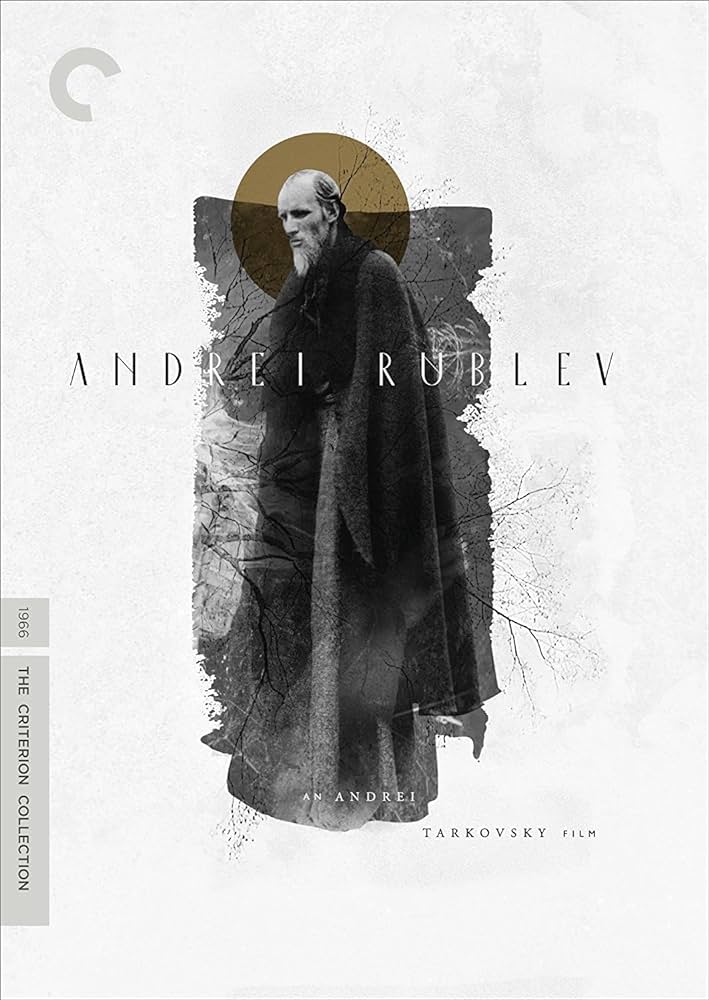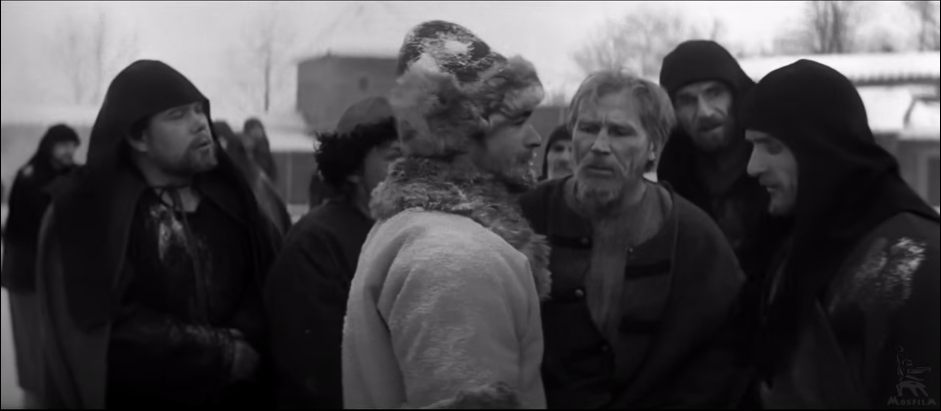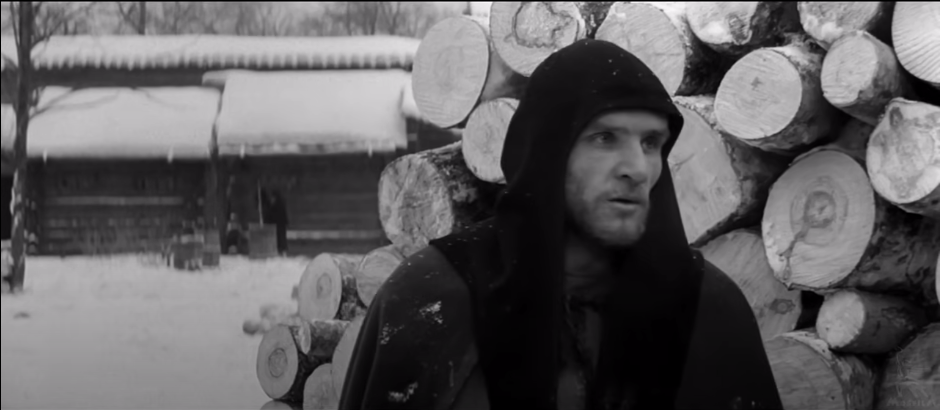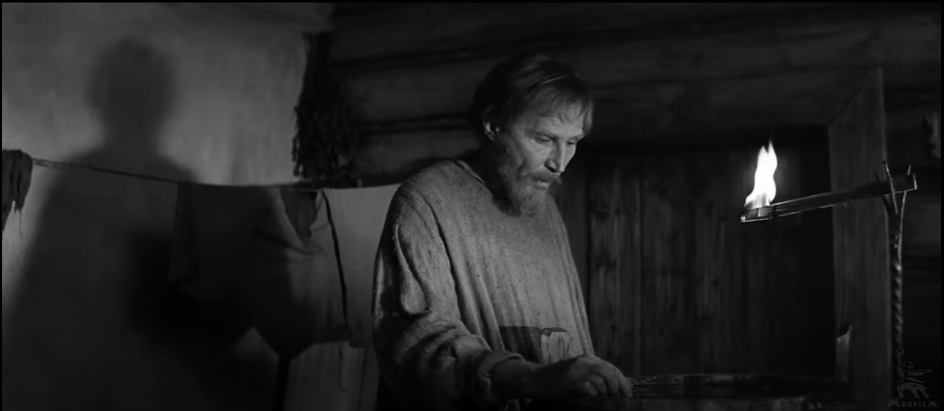by Derek Neal

1.
Three men walk across a desolate landscape. They are dressed in robes, but they might as well be rags. One is barefoot, and the ground is muddy. Who are they? Where are they going?
“There must be lots of painters in Moscow,” the one called Daniil says.
“No matter, we’ll find some work,” the one called Kirill replies.
They are monks, they paint icons. It is 1400. We understand that they have been together many years. It begins to rain, and the one called Andrei, the youngest one and the most talented, seeks shelter under a tree.
“Come on,” the others say, we’ll be alright. They move on into the storm. From this point on, their unity will begin to break.
2.
Some years later Kirill wanders into a workshop. He thinks he is alone, but he comes across another man reclining on a bench. This man is called Theophanes the Greek. Outside, a heretic is being tortured; inside, all is cool and calm. Kirill begins to admire the paintings he sees, and Theophanes realizes he is in the presence of a man of a certain intelligence.
“Where do you come from?” asks Theophanes.
“The Andronikov Monastery,” replies Kirill.
“Andronikov?” says Theophanes, his interest piqued. “Then you must be Andrei Rublev.”
Kirill looks down, blinks repeatedly. We see his face when Theophanes talks; we see his pride has been hurt. “No,” he tells Theophanes, regaining his composure.
“I’ve heard of him” Theophanes continues. “Everybody praises him.”
The camera remains on Kirill’s face, showing the effect these words have on him.
“He is a master,” Kirill admits. “But he could never do this.”
Kirill goes on to praise Theophanes’ work, and Theophanes responds by offering Kirill the chance to be his assistant. Kirill, for some reason, declines. Theophanes insists, but Kirill declines again. Finally, after being asked a third time, Kirill agrees, but on one condition:
“I’ll work for free. Only you come for me in Andronikov, and in front of the whole community and our bishop ask me to come and help you. With all our brethren present, and Andrei Rublev, too. Then I’ll be like your slave, I’ll serve you like a dog until I die.”
Kirill’s face, which has been downcast throughout the scene, is now lit up, illuminated. He seems possessed by a spirit, imagining the honor he will receive and the glory that will be his. He is even willing to become like a dog to have this special moment. We don’t see Theophanes’ face, but it seems he agrees to Kirill’s conditions. The scene then cuts back to the outside of the workshop as a man is tortured on a wheel. Fate seems to have smiled on Kirill, but the message is clear: his time will come, too.
3.
“The Prince commands you to come to Moscow to decorate the Annunciation Cathedral with Theophanes the Greek.”
These words are spoken to a crowd of people outside the Andronikov Monastery, but we don’t see any recognizable faces. Then Andrei Rublev is approached. “Is he really Andrei Rublev?” the man asks.
Kirill appears from behind a mass of bodies. “Yes, he is Rublev. And I’m Kirill,” he says, searching the man’s face.
The man ignores Kirill and places his hands on Andrei’s waist. “Theophanes the Greek wants you in Moscow,” he says. Andrei is surprised by the request, but we don’t see his reaction. Instead, Kirill’s face, the weight of realization on it, is the one facing the camera.
Finally Andrei responds: “Tell him…well…I’ll be there.”

The man leaves and we see Daniil stacking logs. Kirill is next to him, crestfallen. Andrei approaches and, for the first time, we see the pride he feels at being called upon. He ignores Kirill, who leaves, and approaches Daniil.
“Why not start out today, Daniil? Just pack up and set off!” He wipes the snow from Daniil’s back. Then, as a joke: “Before Theophanes has changed his mind!”
Daniil continues to stack logs; he cannot look at Andrei. “I’m not going.”
Now Andrei’s face changes. “How’s that? I can’t do it without you.”
“That’s your problem,” Daniil says, looking at Andrei for the first time.
“I thought we’d go together,” Andrei says, tension entering his voice.
“Why think for me? I wasn’t asked.”
Andrei turns away. “I can’t go without you.”
“Yes, you can. You said ‘yes’ without asking me. Theophanes had only to beckon.”
Daniil walks off. Doubt crosses Andrei’s face. Yet he must recover, and he does after a moment, calling on his younger apprentices to prepare themselves for the trip to Moscow.

4.
The scene switches to Kirill in his room, the morning of Andrei’s departure. He is looking at a painting, perhaps one of his own, but we are not allowed to see it. Instead we see Kirill seeing the painting. In voiceover, Kirill narrates Ecclesiastes:
Rejoice, O young man, in thy youth; and let thy heart cheer thee in the days of thy youth, and walk in the ways of thine heart, and in the sight of thine eyes: but know thou, that for all these things God will bring thee into judgment.
Kirill, we imagine, is reflecting on his own youth, and the success that Andrei is having which Kirill never had. A dog barks, breaking Kirill’s attention. He puts the painting away and sits down.
Remember now thy Creator in the days of thy youth, while the evil days come not, nor the years draw nigh, when thou shalt say, I have no pleasure in them.
Now Kirill sits up, moving towards the basin in his room.
While the silver cord be not loosed, nor the golden bowl be broken, nor the pitcher be broken at the fountain.
Then shall the dust return to the earth as it was: and the spirit shall return unto God who gave it.
Vanity of vanities, saith the preacher; all is vanity.

Kirill’s reflections are interrupted by a young boy, who he then throws out of his room.
I first watched Andrei Rublev as a 21-year-old exchange student in France. I did not like it. I couldn’t follow the story and became confused trying to keep track of the characters. We watched it in a film class, and the subtitles being in French probably did not help, either. Why was the story interrupted to show characters who would never appear again, or to show a horse, or a man in a hot air balloon? What did it all mean? I couldn’t make much sense of it. And the ending with the icons—why was I being forced to look at still shots of paintings in a movie? I felt like Pauline Kael in her review of Thérèse, which Paul Schrader mentions as a criticism of her film taste: “Watching Thérèse is like looking at a book of photographs of respectfully staged tableaux and not being allowed to flip the pages at your own speed. You have to sit there while Cavalier turns them for you, evenly, monotonously, allowing their full morbid beauty to sink in. You’re trapped inside his glass bubble.” Referring to this description, Schrader writes “Exactly.” What is a flaw to Kael is the pinnacle of style to Schrader.
In that film class, we kept watching Andrei Rublev. What I mean is, we’d come to class, and the professor would show us an hour-long sequence, and then he’d talk to us about it, and then he might show the same scene again. Class was three hours long. Then we’d do it all over again the next week. In total, I probably saw Andrei Rublev three or four times that semester if you added up all the viewings of repeated scenes. The other film we did this with was Fellini’s Satyricon, and that was it. A whole semester for two films. When I went back to the states the following year, I signed up for a film class thinking it would be like this. It wasn’t. We barely watched any movies in class, were expected to view the movie outside of class on our own time, and covered three or four movies a week. There wasn’t much discussion of the movies in class or close viewings, but there was a lot of talk about what the movies could tell us about history, or colonialism, or gender roles, or pretty much anything other than the film itself. In this case, movies were simply cultural products that could teach us about the society that produced them. In the Rublev class, I didn’t know what we were learning, but I do now: we were learning to see.
After all those viewings, I couldn’t say I really liked Andrei Rublev, but I did feel connected to it in some way, like it had made an imprint on me and I wouldn’t be able to forget it. Last month, I had the opportunity to go see the movie again. Ten years had passed since my film class, and I thought it would be interesting to see the impression the movie made on me. I went to the theater by myself and was stunned to see that it was practically full. In line, someone ahead of me said he’d driven in from an hour away. The parking lot of the theater, usually with a few spots available, was overflowing. I circled the block multiple times until I found street parking, and others must have done the same because the movie started late. I bought a coffee to focus my attention, put my phone on airplane mode, and settled in.
The movie was not as I’d remembered it at all. Of course I recognized scenes and images, but the feeling and the weight of the movie was completely different to what had lodged in my memory. This time, I was floored by how much emotion and humanity were conveyed in a look, a glance, or a pause. In the scenes I’ve summarized above—really just a 10-minute section early in the movie—life is captured in a clear and pure way that says: this is what it is to be a human on this earth. No matter that these are monks in 15th century Russia—when Kirill lets pride get the best of him; when Daniil spurns Andrei; when, later on, Andrei and Daniil tearfully reconcile before his departure; and when Kirill leaves the monastery, blinded by rage and envy—I know this, we all know this. Every spectator in the audience has been there, and will be there again.
I left the theater and found my car, but I didn’t want to leave the world of the film. I drove home in silence without taking my phone off airplane mode. I looked up at the moon and saw the breath in front of my face. I felt like I was seeing the world the way Tarkovsky saw the world, because I’d just been inside his mind for three hours. I climbed into bed and the next morning, I was myself again. In ten years, I’ll watch Andrei Rublev again.
